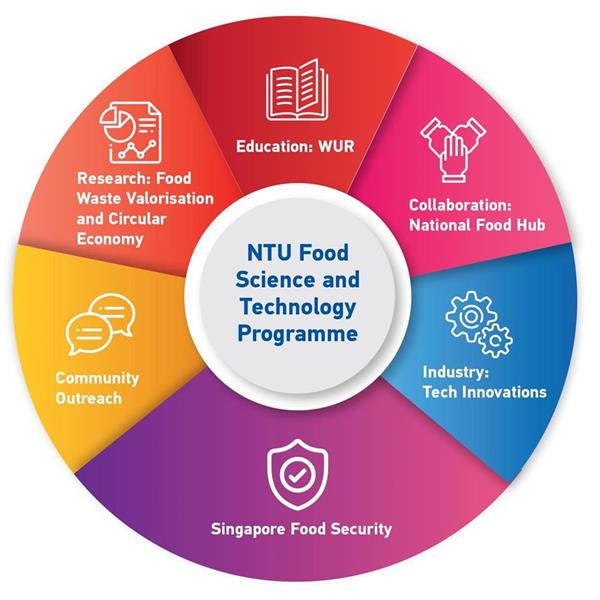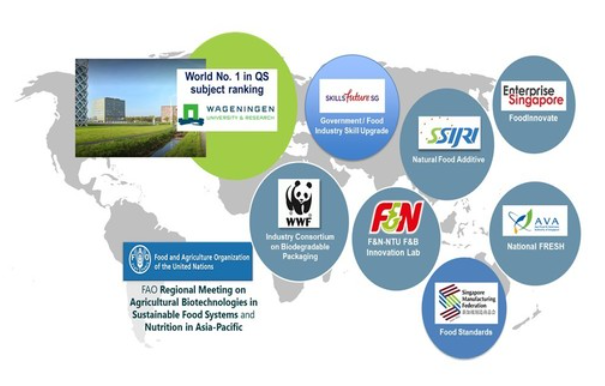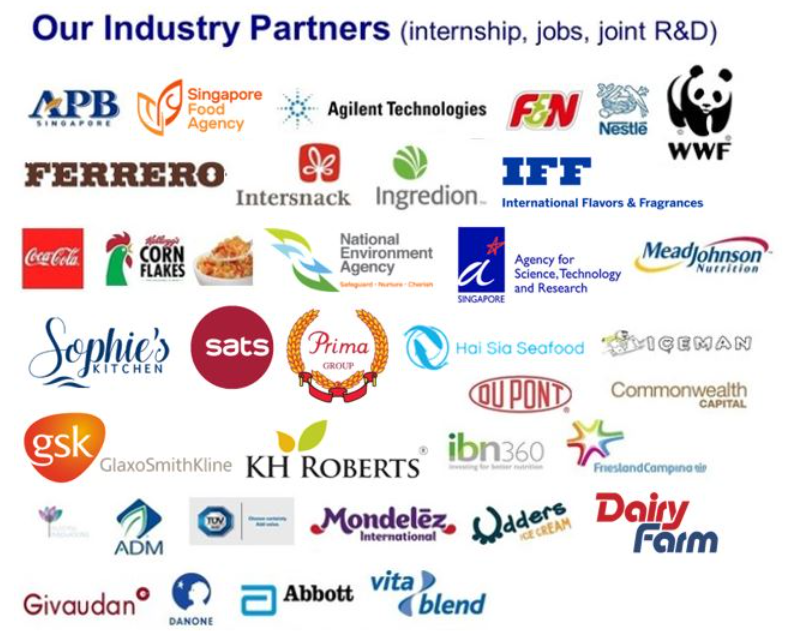Research

Food security is generally defined as to provide population with readily available and safe food of appropriate nutrition level at an affordable price. Enhancing food security for Singapore is even more important considering the limited farming capacity and, as a result, heavy dependence on food import (more than 90%) for local consumption. Disruption of food supply and cost fluctuations in food import are real challenges to be addressed. We have experienced it on a few occasions during the Covid pandemics. The impact on the environment by the amount of food waste (800,000 tonnes) and plastic packaging waste (800,000 tonnes) generated yearly in Singapore needs to be reduced. In addition to ensuring food safety, three critical areas for food security in Singapore may include primary production, post-harvest processing and nutrition for the ageing population.
Technology innovations are key to enhance food security in Singapore. These may include new ways to monitor food supply chain and enhance food fraud traceability (blockchain and artificial intelligence), integrated system for urban farming (sensor for real time monitoring of farming conditions), technology-driven food waste management (zero waste food processing), new ways to measure gut microbiome as indicator of food nutrition (non-invasive measurement of gut microbiome functionality), and platform technology to develop alternative and unconventional food sources (insects and microalgae).
NTU's strength in interdisciplinary research with their strong credentials in technology innovations, make us strong leaders for this important endeavour. Progress made by NTU Food Science and Technology Programme (NTU FST) has been encouraging, and generated significant interest and investment from food industry and government agencies.
NTU FST researchers have successfully developed technology innovations of relevance to Singapore food industry. For example, fermentation technology has been developed for nutrient recovery from side-streams of food processing industry, including Okara (Click HERE for link) and brewer's spent grain (Click HERE for link). NTU FST has further developed green extraction technology to extract cellulose from the remaining solid residues after fermentation, and developed biodegradable packaging materials (Click HERE for link). Similar green processing technology has been developed by NTU FST to convert waste cooking oil into natural carotenoids which are high value food additives (The Straits Times, 11 June 2015, page B2). To further reduce chemical substances in processed food products with extended shelf life, NTU FST has developed innovation to sustainably produce natural food preservatives (Click HERE for link). NTU FST researchers has also successfully developed more innovative technology in recent years to further reduce food waste and put into good use. Refer to below news article and links for more information.
The technology innovations developed by NTU FST have contributed to Food Circular Economy scenario, in which all raw materials for food processing industry would be fully utilised thus showcasing the feasibility of Zero Waste Food Processing.
NTU FST technology innovations have also been featured internationally, including in IFTNEXT Newsletter. IFT (Institute of Food Technologists) is an international, non-profit scientific society of professionals engaged in food science, food technology, and related areas in academia, government and industry. It has more than 17,000 members from more than 95 countries. IFTNEXT Newsletter published every Tuesday explores what are, arguably, the next big things in the science of food (IFT Link). Our featured innovations include zero waste food processing as well as natural food preservatives.
NTU FST has now been engaged by food industry for commercialisation of their innovations, either through joint laboratory, with either industry's direct investment or jointly with government co-funding support. One such engagement is the opening of the F&N-NTU F&B Innovations Lab in January 2019 by Singapore Minister for Education Mr. Ong Ye Kung. It is F&N's first long-term joint research partnership with an academic institution in their 135 years of history.
NTU FST has also been identified as technology partner in Food Innovate, a new initiative by Enterprise Singapore. NTU FST has also been a key driver in a national food hub on food safety and innovations.
NTU FST has been actively engaged in community outreach, with regular media appearances (newspapers and television) to showcase our innovations as well as explaining food matters to the general public. In addition, NTU FST technology innovations have been used to organise workshops for students and food industry.
Taken together, NTU FST has evolved from an education programme in FST into a vibrant platform offering education training, research on food technology innovations, government collaboration, food industry engagement and community outreach.
| Food Innovate |  | Discovery Research |
| Resource Partners |  | Applied Research |
 | Equipment Rental |
| National University of Singapore (NUS) www.fst.nus.edu.sg    | Food companies may engage NUS Food Science & Technology for joint research or new product development projects with the students and faculty members. Companies may also access processing and analytical equipment on a rental basis.
Visit its website for the list of equipment. |
| Singapore Institution of Technology (SIT) www.singaporetech.edu.sg    | With a focus on elderly nutrition, companies may partner with SIT to develop functional food for elders, optimise food processing and scale up. SIT also has capability in food characterisation for food safety and product development. |
| Nanyang Technological University (NTU) www.ntu.edu.sg/fst  | Starting from an education partnership with Wageningen University & Research, NTU Food Science and Technology has developed novel processing technologies, in particular for valorisation of food waste, to enhance food security and reduce
environmental impact. |
| Clinical Nutrition Research Centre (CNRC) www.a-star.edu.sd/cnrc  | CNRC conducts research and human nutrition studies to deliver new and innovative solutions catered to the Asian population, to enhance health and wellbeing. Key focus areas include prevention and management of obesity and Type II diabetes. |
| Food Innovation & Resource Centre (FIRC) www.firc.com.sg    | FIRC provides technical expertise in new product and process development including packaging, shelf life, sensory evaluation, automation and market testing. Food companies can also conduct trials using FIRC’s pilot-plant scale
processing equipment that can be found on its website. |
| Temasek Polytechnic (TP) www.tp.edu.sg/asc   | TP houses a Centre of Innovation for Complementary Health Products (CHP) that offers accredited chemical, microbiological and Glycemic Index (GI) testing by the Glycemic Index Research Unit. Its Centre for Applied Nutrition Services
supports development of low GI products to optimise health for disease prevention. |
| Nanyang Polytechnic (NYP) www.nyp.edu.sg/scl   | The Centre for Functional Food & Human Nutrition (CFFHN) examines, therapeutic benefits of functional ingredients and translates them into development of new functional food. Companies may also access the processing equipment for
baking, fermentation, meat, beverage and minimally processed food (fresh produce) in NYP. |
| Republic Polytechnic (RP) www.rp.edu.sg/sas   | RP’s functional food formulation lab, Nu3Lab, supports food companies in the formulation, sensory evaluation and processing to develop food with health benefits. Through joint projects with the polytechnic, the RP-Wilmar Innovation
Centre offers companies access to technical expertise on food application and product testing. |
| DSM Nutrition Products www.dsm.com   | Food companies may work with Royal DSM, a functional ingredient supplier to leverage its knowhow in nutrition science and its application facilities in Singapore to co-innovate for new functional food products. |
| KH Roberts www.kh-roberts.com   | Food companies may engage KH Roberts for flavour creation and application support in the product development process by accessing its flavour specialists at its integrated manufacturing facility. |
| Warehouse Logistics Net Asia (WLNA) www.wlna.com.sg  | WLNA is the operator of the HPP resource sharing facility in Singapore. Food companies may engage WLNA’s HPP tolling service and its full suite of logistics services such as cold chain storage, distribution and export of food products. |
| Nestle Quality Assurance Centre of Singapore (NQAC) www.nestle.com.sg/nqac-singapore | NQAC specializes in a range of accredited analytical testing services such as chemical contaminants, gluten and toxins. Companies may engage NQAC to test their products prior to launching them into the market. |
| IP Intermediary (IPI) www.IPI-singapore.org | Food companies with specific innovation or technology challenges may approach IPI to scout for suitable solutions from its global network of technology partners and market places. |

NTU FST has been actively engaging food industry and external collaborations.
Our FST programme office has made direct arrangement with a growing number of food companies and external organizations (see enclosed summary image) for internship placement.

Our R&D collaborations with food industry and external organizations (included in the same summary image) are taking place under various frameworks:
- Research Collaboration Agreement - food tech innovations from NTU FST have attracted direct investment and IP licencing from a growing number of food companies. The process of Research Collaboration Agreement has been facilitated by NTUitive. One publicised case is the F&N-NTU F&B Innovation Lab, which was officially opened by Singapore Minister for Education Mr. Ong Ye Kung on 07 Jan 2019. This is F7N's first external research lab and their first long term collaboration with a local University in their 135 years of history. NTU FST is working with MNCs and local SMEs (funded by ESG) on various food technology related projects. In addition to industry collaboration, Research Collaboration Agreement has also been used to promote collaboration with government agencies including the new National Food Hub which would be hosted by NTU FST.
- Gift Agreement - NTU FST has been working with a growing number of food companies under the framework of Gift Agreement, which has been coordinated by NTU Development Office. The gift for NTU FST programme would also provide subsidies for needy students as well as funding FST Professorships.





.tmb-listing.jpg?Culture=en&sfvrsn=f093c00b_1)









